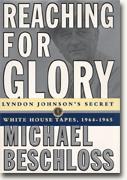Reaching for Glory
Michael R. Beschloss
book reviews:
· general fiction
· chick lit/romance
· sci-fi/fantasy
· graphic novels
· nonfiction
· audio books
· author interviews
· children's books @
curledupkids.com
· DVD reviews @
curledupdvd.com
newsletter
win books
buy online
links
home
for authors
& publishers
for reviewers


|
Reaching for Glory: Lyndon Johnson's Secret White House Tapes, 1964-1965 Michael R. Beschloss Simon & Schuster Hardcover 352 pages November 2001 |
|
Beschloss’s selections flow chronologically and are interspersed with lucid explanations and occasional excerpts from Lady Bird Johnson’s diary. The book is assiduously footnoted. It is as fluid as possible, considering its character. To a “mature” reader, Johnson’s self-revealed image as a titanic but paranoid figure wheeling and dealing, arm-twisting, and sucking-up to create consensus brings back those days in all their sturm und drang. Reaching for Glory is not “feel-good” history; rather it is about the gritty, gutty, real performance of a man who moved mountains and was finally crushed by an avalanche of detritus. That avalanche was primarily caused by Vietnam. By the American hubris that we could police the world, a belief that both left and right initially subscribed to, that led us to forty-seven thousand battle deaths, burning cities, and a fractured self-image that has only recently once again become whole. Johnson made a fateful escalation in August of 1964 after a naval encounter between North Vietnam and forces initially deployed by Jack Kennedy. He secured from Congress the Tonkin Bay Resolution that, ever after, he considered equivalent to a Declaration of War. As in recent days, a President suddenly at war after the country is attacked is fanatically popular. The fall election in 1964 resulted in a landslide against Goldwater, control of Congress, and the stage set to rival Roosevelt in helping the unfortunate. That embrace of war with reform was a vampire’s kiss, however. In February of 1965 Johnson began to bomb North Vietnam and deploy infantry. Civil unrest began immediately and soon thereafter, Johnson was in trouble. His window for reform closed. The President’s emotionalism, complexity, and contradictions are shown on every page. Jackie Kennedy and he are close, “smarmily” close, until she eventually distances herself in fear of being used against Bobby Kennedy. He is loyal to Jack Kennedy’s legacy, yet jealous as hell of the Kennedy family and its entourage’s sophistication. He berates the Republicans for immorally stealing an election and then glories with confederates on a Texas victory won in the same manner. He pours the pressure on North Vietnam, yet mourns every American casualty, and is fairly sure early that he can’t win. One hears much today about the evils of partisanship. If this reviewer hadn’t read of the calumny, even duels fought during Washington’s administration, he might have thought that the sixties originated political wrangling. However, partisanship is natural because power is the ultimate prize. But in the sixties, bitterness over that struggle reached new heights. The fierce differences covered more than the division of spoils. It raged over racial, economic, war, gender, drug, and age issues and split the populace into multiple pressure groups almost all willing to do violence. A fierce time. Reaching for Glory is a great memorial of that time. © 2002 by Dean Warren for Curled Up With a Good Book |
|
|
|
 Click here to learn more about this month's sponsor! |
|
| fiction · sf/f · comic books · nonfiction · audio newsletter · free book contest · buy books online review index · links · · authors & publishers reviewers |
|
| site by ELBO Computing Resources, Inc. | |
 Younger readers may connect the sixties only with what they’ve heard about pot, sexual liberation, and Vietnam War protests. But September 1964 to September 1965 was also the period in which the Civil Rights and Voting Rights Acts were passed, when segregation was outlawed and “Great Books” tests for voting banned. Because of dixiecrat revulsion from those accomplishments, the solidly
democratic south became as republican as it is today. Johnson also pushed through Medicare (the “impossible bill”), a War on Poverty, and major initiatives to federally fund education. That year saw the crest of the mid-century Democratic Party reform wave that started with Roosevelt, continued under Harry Truman, and finally petered out with a move to the center by Carter and Clinton.
Younger readers may connect the sixties only with what they’ve heard about pot, sexual liberation, and Vietnam War protests. But September 1964 to September 1965 was also the period in which the Civil Rights and Voting Rights Acts were passed, when segregation was outlawed and “Great Books” tests for voting banned. Because of dixiecrat revulsion from those accomplishments, the solidly
democratic south became as republican as it is today. Johnson also pushed through Medicare (the “impossible bill”), a War on Poverty, and major initiatives to federally fund education. That year saw the crest of the mid-century Democratic Party reform wave that started with Roosevelt, continued under Harry Truman, and finally petered out with a move to the center by Carter and Clinton.